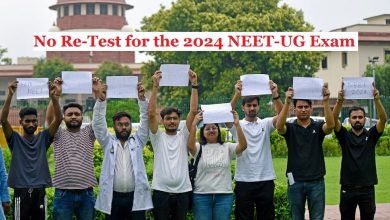Education Is Not Business; Tuition Fee Shall Always Be Affordable: Supreme Court
Private colleges are directed to refund the excess amount last fixed by the state government in 2011. On remark of this, a bench of justices MR Shah and Sudhanshu Dhulia on Monday said, “Education is not the business to earn profit. The tuition fee shall always be affordable.”

New Delhi: Supreme Court that tuition fees must be affordable as Education is not a business to make profits. It noted that in 2017 Andhra Pradesh government decision mandated a seven-fold rise in the state’s medical education/course fee, bringing it to 24 lakh a year.
Private colleges are directed to refund the excess amount last fixed by the state government in 2011. On remark of this, a bench of justices MR Shah and Sudhanshu Dhulia on Monday said, “Education is not the business to earn profit. The tuition fee shall always be affordable.”
On 6th September 2017, Andhra Pradesh Government by its G.O (Government order) enhances MBSS tuition fees.
The court said, “We are of the opinion that the High Court has not committed any error in quashing and setting aside the Government Order dated September 6, 2017, enhancing the tuition fee for the block years 2017-2020.”
Additionally, the court added, “To enhance the fee to ₹ 24 lakhs per annum i.e., seven times more than the fee fixed earlier was not justifiable at all. Education is not the business to earn profit. The tuition fee shall always be affordable.”
The disgruntled medical students informed the court that the government’s decision to hike the cost on September 6, 2017, had been made without waiting for the approval of the Admission and Fee Regulatory Committee (AFRC).
The state government’s decree was deemed “wholly impermissible and most arbitrary” by the bench. The raise was even described as being made primarily with a view to favour or obligate private medical institutions.
“Any enhancement of the tuition fee without the recommendation of the AFRC shall be contrary to the decision of this court in the case of PA Inamdar in 2005 and the relevant provisions of the 2006 AFRC Rules (prevailing in the state),” the bench said. “The high court has rightly quashed and set aside the GO dated September 6, 2017.”
The students also said that the state introduced a hike in tuition fees after consulting AFRC in 2011. However, in 2017, the state only took action based on information provided by private medical colleges. The state was required to get a previous report from the panel before changing the cost under Rule 4 of the Admission and Fee Regulatory Committee (for Professional Courses provided in Private, Unaided Professional Institutions) Rules, 2006.
The court was required to note that the fixation rules must be followed and that the elements listed in Rule 4 of the Rules, 2006, must directly relate to the fee determination or review. It includes the location of the institution, nature of the professional course, cost of available infrastructure, expenditure on administration and maintenance, reasonable surplus required for growth and development of the institution, revenue foregone on account of waiver of fees in respect of students from the reserved category or economically weaker sections (EWS) of the society.
Furthermore, the court also noted that the Admission and Fee Regulatory Committee (AFRC) must consider all these factors while determining the fees or reviewing it.
The court observed, “Determination of fee/review of the fee shall be within the parameters of the fixation rules and shall have the direct nexus on the factors mentioned in Rule 4 of the 2006 Rules…the state government enhanced the tuition fee at an exorbitant rate of ₹24 lakh per annum, almost seven times the tuition fee notified for the previous block period.”
Also, the court declares that the decision of the Andhra Pradesh High Court is to refund the number of fees collected during the G.O ( Government Order) dated 6th September 2017. Thereby, the court stated that ” The High Court is absolutely justified in quashing and setting aside Government Order dated September 6, 2017.”
The college told the Supreme Court that the tuition fees had not risen between 2011 and 2017, they had incurred additional costs as a result of the 2016 necessity to offer students a stipend. The court informed the institution that this element will be paid as soon as the AFRC establishes the higher tuition prices. However, the college was not allowed to keep the money that was unlawfully gathered.
Also Read: Supreme Court Upholds 10% EWS quotas in Admissions and Jobs





